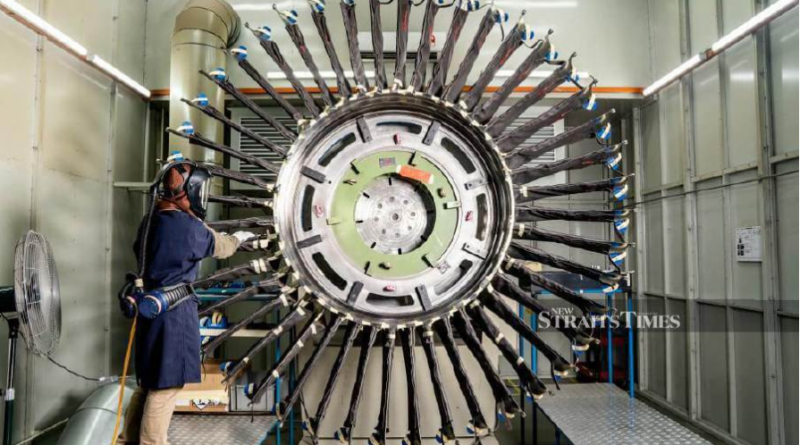Aerospace players face big losses
KUALA LUMPUR: Malaysia’s aerospace sector is expected to incur between RM100 million and RM300 million of losses during the two-week period of Enhanced Movement Control Order (EMCO) from July 3-13 this year.
The projection was made by Malaysia Aerospace Industry Association’s (MAIA) members based on their initial survey after taking into account the temporary halting of operations.
MAIA president Naguib Mohd Nor said local aerospace players could severely incur huge losses from contracts with Airbus and Boeing as well as other original equipment manufacturers (OEMs) as Malaysia was a critical part of the global supply chain.
“Prior to the first MCO, the aerospace industry was making RM16.4 billion per year. The first MCO saw the revenue dropped by about 65 per cent. Prior to this EMCO, it was hovering around 50 per cent reduction in revenue,” he told the New Straits Times recently.
MAIA expects the industry to record a lower loss if the government allowed aerospace components manufacturing to resume operations under a controlled manner before the EMCO ended.
The EMCO has been extended in Selangor’s major sub-districts and several Kuala Lumpur localities until July 28.
The government, through the International Trade and Industry Ministry, had last Wednesday allowed more sectors in Selangor to operate during EMCO.
The sectors were electrical and electronics (E&E) and its supply chains, aerospace (MRO), machinery and equipment (for production of healthcare and food products) and key food and beverage (F&B) manufacturing.
Under the aerospace sector, the ministry said the aerospace components manufacturing would now allow to resume operations.
Unfortunately, MAIA said its members’ manufacturing operations still halted as the authority was ignoring the ministry’s letters.
Naguib said local suppliers had seen not only loss of revenue but needed to carry huge inventory of materials, high demurrage and detention charges, as well as high cost operation to recover the five weeks of non-operations throughout the MCO 3.0.
“This is due to the high skilled labour that must be remunerated and facilities and equipment that must be kept in working condition,” he added.
For example, Naguib said autoclaves to make carbon fibre could not be left idle for long periods. The situation had pushed some players into negative cashflow, slashing almost 50 per cent of their revenues.
“The EMCO will definitely place all of us (aerospace players) in dire straits. We will be hit by another huge wave inventory and raw material scrap due to shelf life. We will fail to fulfill our obligation to Tier-One and OEMs on the components delivery,” he cautioned.
Naguib said players would also need to catch up with the delivery schedule to transport the finished goods after undergoing two-week shut-down period.
“The air freight cost has increased by three fold on average during the pandemic,” he said.
Naguib said Malaysia was the single source manufacturer for many commercial aircraft namely for the A320, A321, A350, B737, B777, B797, among others.
“Failure to supply will led to major disruptions to Tier One such as Spirit Aerosystem, Collins Aerospace, GKN Aerospace and Sonaca,” he added.
Subsequently, he said this failure would cause major disruption to OEMs for Airbus and Boeing.
“As a result, this will amplify our Malaysian supplier risk ratings to OEMs and Tier-Ones which will trigger them to review their current business that they have in Malaysia,” he said.
For example, he said the reported current bidding of RM4 billion from Composite Technology Research Malaysia Sdn Bhd could be at risk.
“Our neighbouring countries Vietnam and Indonesia are actively encouraging foreign direct investments (FDIs). With the current imposition of MCO 3.0, it will only trigger the Tier-Ones and OEMs to consider de-risking their current business by moving/relocating work to those countries,” he said.
Naguib said the aerospace industry was unlike any other as it was a globally integrated and relatively exclusive supply chain with high barriers to entry.
“Over the last 50 years, Malaysia has painstakingly built its supply chain into one of the most enviable in manufacturing and maintenance, repair and overhaul (MRO) in the region.
“We have built a high skilled workforce whom today from the shop floor up to the management offices are evolving our industries capabilities towards higher and higher value activities leveraging on more and more automation and digitisation.
“We are are an Industry 4.0 benchmark industry for Malaysia showing the way for future proof business and technology processes,” he said.
Naguib said the aerospace sector is one of the few industrial bastions adopting the Fourth Industrial Revolution (IR 4.0) as a requirement from clients, unlike many other industry who were still struggling with issues of business practices dependent on low cost foreign labour.
Source: NST

